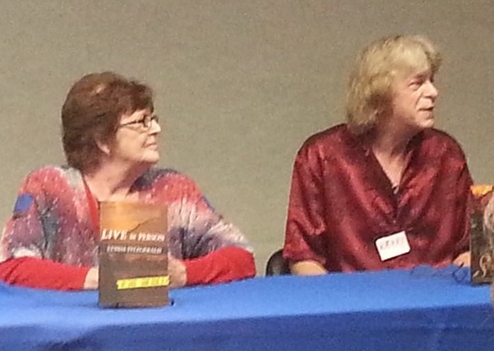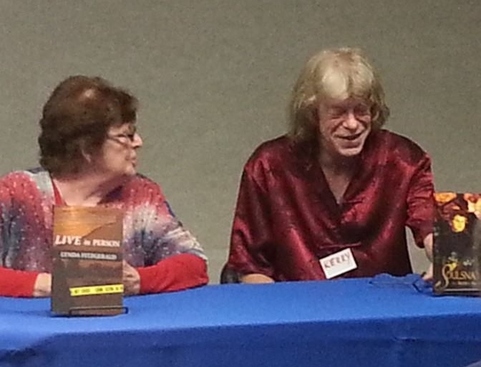5 Things NOT to do as a Public Speaker

What’s the best way to engage your audience when speaking publicly? Based on my personal experience speaking as an author at writing seminars and appearances on panels—and based on watching others make a complete mess of their “big chance”—here are 5 things you should NEVER do as a public speaker:
1) Don't Preach or Pontificate
Okay, if you’re a minister or teacher, preach away. Otherwise, if you preach at your audience, it comes off as a lecture, and you’re not engaging those who took the time off from their busy schedules to attend your grand performance. Yes, share important information related to your subject material (see #5), but involve your audience as if they are participating in a personal discussion. Make them feel like they’re a primary part of your presentation. By not preaching, you avoid coming off as arrogant or condescending.
2) Don't Scowl, Sneer, or Smirk
No matter how much you may wish to share and personify your disgust or disdain for people or methods that handle your subject matter the wrong way, don’t do it. Smile! Lively facial expressions are important in communicating your opinions and sharing your knowledge with your audience, but smile a lot when you do it. Laughter and chuckles are good too, just don’t make them come from a derisive perspective. If you scowl, smirk, or sneer, you will look like a sanctimonious know-it-all no matter how much your audience may agree with you. As the old adage says, you can catch a lot more bees with honey than you can with vinegar. Smiling makes you look like you’re happy to be there—just make sure it’s genuine. Don’t be embarrassed to practice in front of a mirror in preparation for your presentation. By doing so, you'll learn what works best for you.
3) Don't Stammer or Stutter
Seriously: don’t. Know your subject material inside and out, and be prepared to answer questions about it after your presentation. In fact, finishing up with a question and answer session is a great way to involve your audience and make them feel like they’re a vital part of your presentation, as well as provide additional information that you didn’t cover in your demonstration. Again, rehearse your material in front of a mirror and/or a friend or group of friends. There’s a good reason the Boy Scouts of America are well-respected for always being prepared. Make sure you are too. Don't wander off into tangents either, or you'll lose your audience's attention. Above all else, avoid the dreaded “uhh...” like you would an army of invading Orcs or a legion of hungry zombies.
4) Don't Make It All About YOU
Set your ego aside, at least for public appearances. Really, nobody likes a pompous egomaniac. Make your presentation about your subject matter as it applies to others instead, and what knowing more about it can do to help your audience improve their skills in personally implementing what they’ve learned after you step off that podium. If they leave feeling like they’ve learned something valuable about your subject matter instead of all about how good you are at utilizing it, they’ll come back for more in the future—and maybe even bring some friends or colleagues next time. Above all else, make regular eye contact—this makes your audience feel not only like they are a crucial part of your presentation, but also like they have made a vital connection with you personally. A Power Point presentation is a great way to share important information on your subject matter, but don’t let it be your only or even primary method—you’re a person talking to people, not a robot, mechanical device, or documentary on PBS. And for crying out loud, whatever you do, don't tell your audience you're getting tired, and that if they want to learn more to just follow you on Twitter, Facebook, and buy your book or whatever you're selling. (Yes, I actually witnessed a writer do this recently.)
5) Don't Read From a Prepared Text
If you do this, you won’t be lively, you won’t be smiling, and you won’t be making eye contact and connecting with your audience, no matter how interesting the prepared text may be. Reading from prepared text means you’re looking down, not at your audience, and likely boring them too. Occasionally scanning personal outline notes to keep your presentation structured in the way you intend it to be is fine, but minimize that as much as possible, and keep your audience engaged from start to finish. Actors rehearse their lines; you should too. Reading prepared brief quotes directly related to your subject material is fine, but keep that to a minimum too, and make sure they’re poignant and will stick in your audiences’ minds as a way to refer to the primary points you’re making or the knowledge you’re sharing.
In conclusion, after you’re introduced, be sure to tell your audience that you’re honored to be there before them that day, that you’re grateful they attended, and when you're finished, be sure to thank them again for coming. And by all means, feel free to tell them about any future engagements you may have scheduled, how they can learn more detailed information about your subject matter, and how they can personally connect with you via your website(s) and various social media networks. If at all possible, prepare and bring multiple copies (including business cards, pamphlets, flyers, etc.) of printed material related to your subject matter that you can share as handouts, with all your contact info listed on it.
I heartily welcome any comments you wish to share, as well as any additional "do's" or "don't's" you can add.
I hope this list has been helpful in preparing you for your upcoming speaking engagements, and best of luck to you all when you’re standing in the spotlight!
I heartily welcome any comments you wish to share, as well as any additional "do's" or "don't's" you can add.
I hope this list has been helpful in preparing you for your upcoming speaking engagements, and best of luck to you all when you’re standing in the spotlight!
* * * * *

Kerry Alan Denney, aka The Reality Bender, is the multiple award-winning author of SOULSNATCHER (Lazy Day Publishing, April 2014) and JAGANNATH (Permuted Press, coming February 2015), as well as numerous published short stories and poems, all listed on his "Books" page of this website. Follow and connect with him on Twitter, Facebook, Goodreads, and LinkedIn. For more information, please write him at kerrydenney(AT)gmail(DOT)com




 RSS Feed
RSS Feed





